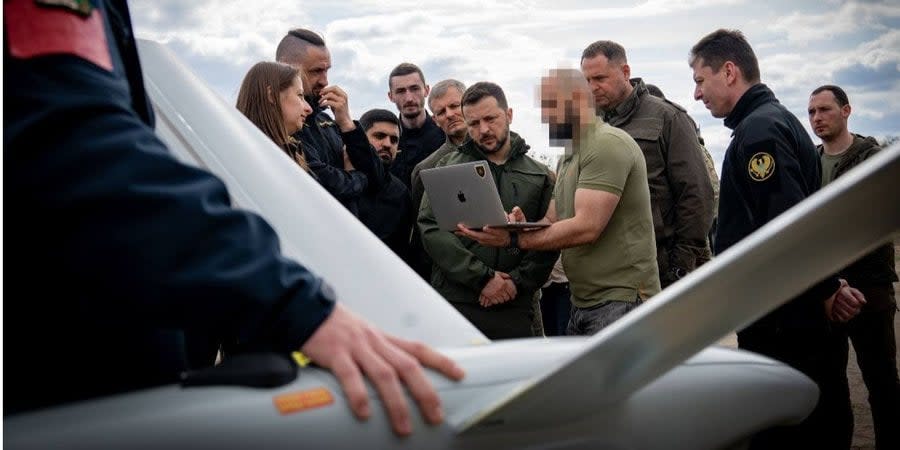Ukraine introduces powerful new drone to counter Russian Lancet

- Oops!Something went wrong.Please try again later.
Ukrainian President Volodymyr Zelenskyy was presented with a new unmanned aerial vehicle (UAV) model from the defense industry that can strike targets over 100 kilometers away and carry a 3-kilogram warhead, the country’s Militarnyi military outlet reported on April 15.
The name of the drone is still under wraps, but it's noted to bear similarities to the Russian Lancet, a medium-range precision attack drone.
The UAV has an electric motor and is launched from a catapult, with an X-shaped fuselage for maneuverability. It can carry various types of warheads, including fragmentation, thermobaric, and armor-piercing, capable of penetrating up to 40 mm of armor. It can engage both static and moving targets along multiple trajectories.
The drone has a maximum speed of 180 km/h and is capable of targeting objects moving slower than 130 km/h, including the Russian Orlan-10, Zala, and Lancet drones. Theoretically, it can also engage hovering or oncoming helicopters.
A “machine vision” integration that detects and automatically tracks targets is another important innovation for the strike system. The drone is currently being refined in the combat zone and has already successfully destroyed enemy equipment
Read also:
Analysts believe that in the long run, the UAV could reduce the strike potential of Russian troops.
The Lancet is considered one of the most effective weapons that Russia deployed in Ukraine in 2023.
As early as Aug. 2023, Ukraine’s Digital Transformation Minister Mykhailo Fedorov reported that Kyiv had developed its own analog of the Russian Lancet drone and was now scaling up the production.
On Feb. 7, Fedorov announced plans to mass-produce analogs of the Russian Lancet attack drones with a range of 40 km, with a contract to be signed in the coming weeks.
"Drones like the Lancet are quite high-tech, and it took us six months to encourage the market in this direction,” he said, adding that “now there are a number of companies on the radar, and we are testing [their] products."
On Feb. 1, Forbes wrote that the attack by the Defense Forces on the Zagorsk Optical and Mechanical Plant (ZOMZ) in Moscow Oblast in the summer of 2023 could have stopped or reduced the production of Russian Lancet drones.
We’re bringing the voice of Ukraine to the world. Support us with a one-time donation, or become a Patron!
Read the original article on The New Voice of Ukraine

